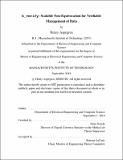| dc.contributor.advisor | Neha Narula. | en_US |
| dc.contributor.author | Aspegren, Henry(Henry B.) | en_US |
| dc.contributor.other | Massachusetts Institute of Technology. Department of Electrical Engineering and Computer Science. | en_US |
| dc.date.accessioned | 2019-07-15T20:28:36Z | |
| dc.date.available | 2019-07-15T20:28:36Z | |
| dc.date.copyright | 2018 | en_US |
| dc.date.issued | 2018 | en_US |
| dc.identifier.uri | https://hdl.handle.net/1721.1/121620 | |
| dc.description | This electronic version was submitted by the student author. The certified thesis is available in the Institute Archives and Special Collections. | en_US |
| dc.description | Thesis: M. Eng., Massachusetts Institute of Technology, Department of Electrical Engineering and Computer Science, 2018 | en_US |
| dc.description | Cataloged from student-submitted PDF version of thesis. | en_US |
| dc.description | Includes bibliographical references (pages 60-63). | en_US |
| dc.description.abstract | Equivocation allows attackers to present inconsistent data to users. This is not just a problem for Internet applications: the global economy relies heavily on verifiable and transferable records of property, liens, and financial securities. Equivocation involving such records has been central to multi-billion-dollar commodities frauds and systemic collapses in asset-backed securities markets. In this work we present b_verify, a new protocol for scalable and efficient non-equivocation using Bitcoin. b_verify provides the abstraction of multiple independent logs of statements in which each log is controlled by a cryptographic keypair and makes equivocating about the log as hard as double spending Bitcoin. Clients in b_verify can add a statement to multiple logs atomically, even if clients do not trust each other. This abstraction can be used to build applications without requiring a central trusted party. b_verify can implement a publicly verifiable registry and, under the assumption that no participant can double spend Bitcoin, guarantees the security of the registry. Unlike prior work, b_verify can scale to one million application logs and commit 1,112 new log statements per second. b_verify accomplishes this by using an untrusted server to commit one hundred thousand new log statements with a single Bitcoin transaction which dramatically reduces the cost per statement. Users in b_verify maintain proofs of non-equivocation which are comparable in size to a Bitcoin SPV proof and require them to download only kilobytes of data per day. We implemented a prototype of b_verify in Java to demonstrate its ability to scale. We then built a registry application proof-of-concept for tradeable commodity receipts on top of our prototype. The client application runs on a mobile phone and can scale to one million users and ten million receipts. | en_US |
| dc.description.statementofresponsibility | by Henry Aspegren. | en_US |
| dc.format.extent | 63 pages | en_US |
| dc.language.iso | eng | en_US |
| dc.publisher | Massachusetts Institute of Technology | en_US |
| dc.rights | MIT theses are protected by copyright. They may be viewed, downloaded, or printed from this source but further reproduction or distribution in any format is prohibited without written permission. | en_US |
| dc.rights.uri | http://dspace.mit.edu/handle/1721.1/7582 | en_US |
| dc.subject | Electrical Engineering and Computer Science. | en_US |
| dc.title | b_verify : scalable non-equivocation for verifiable management of data | en_US |
| dc.title.alternative | Scalable non-equivocation for verifiable management of data | en_US |
| dc.type | Thesis | en_US |
| dc.description.degree | M. Eng. | en_US |
| dc.contributor.department | Massachusetts Institute of Technology. Department of Electrical Engineering and Computer Science | en_US |
| dc.identifier.oclc | 1098041245 | en_US |
| dc.description.collection | M.Eng. Massachusetts Institute of Technology, Department of Electrical Engineering and Computer Science | en_US |
| dspace.imported | 2019-07-15T20:28:33Z | en_US |
| mit.thesis.degree | Master | en_US |
| mit.thesis.department | EECS | en_US |
